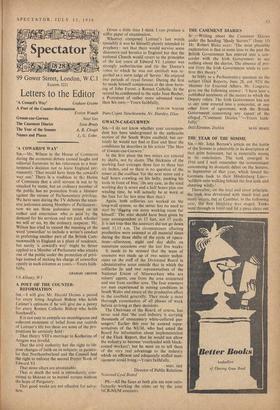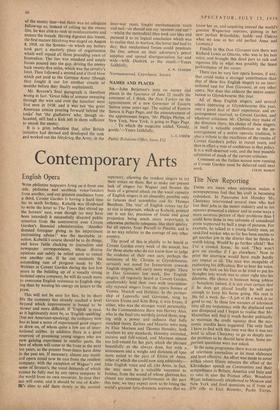THE YEAR OF THE SOMME
SIR,—Mr. John Borrow's article on the battle of the Somme is admirable in its description of that grim holocaust, but is materially wrong in its conclusion. The tank emerged in 1916 and I well remember the communique announcing its dramatic debut on the Somme, in September of that year, which forced the Germans back to their Hindenburg Line— 'soldiers seen walking behind the first tank and cheering wildly.'
Thereafter, on the trial and error principle. the tank was developed with much trial and many errors; bu at Cambrai. in the following year, the first blitzkrieg was staged. Tanks went through in force and bit a piece clean out of the enemy line—but there was no adequate follow-up so, instead of rolling up the enemy line, he was able to rush in reinforcements and restore the breach'. Having digested this lesson, the first mature blitzkrieg was staged on August 8, 1918, on the Somme—in which my battery took part; a masterly piece of organisation which well repaid all those preceding years of frustration. The line was smashed and ample forces poured into the gap, driving the enemy back twenty-five miles, which was the cavalry's limit. Then followed a second and a third blow which put paid to the German Army (though they fought it out for another couple of months before they finally capitulated).
Mr. Borrow's final paragraph is therefore wrong in fact. 'Great tides of armour sweeping through the wire and over the trenches' were first seen in 1918; and it was not 'the great American armies pouring forward behind the tanks' but 'the gladiators' who, though ex- hausted, still had a kick left in them sufficient to smash the enemy.
It is a grim reflection that, after British initiative had devised and developed the tank and worked out the blitzkrieg, the Army, in the inter-war years, fought mechanisation tooth and nail—or should one say 'spanner and nut'? —whilst the methodical Hun took our idea and pursued it to its logical conclusion which was to realise that, in warfare, the horse had had its day; that mechanised forces could penetrate the line, subsist on their adversary's petrol supplies and spread disorganisation far and wide—with Dunkirk as the result.—Yours faithfully,
A. R. CLOUGH
Nornzanswood, Crowhurst, Sussex



































 Previous page
Previous page